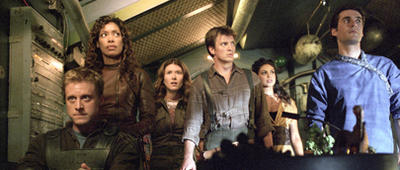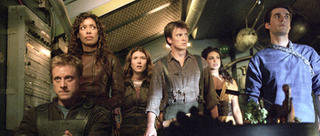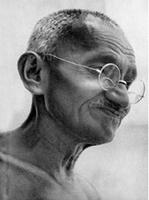The best trick, or perhaps I should say the most sobering exercise, to bring our problem to people's attention was when a libertarian group somewhere went around an Independence Day festival with petitions asking people to support the "American Freedoms Clarification Bill" or some such. My recall is they got fewer than half of the people they approached to sign it, and the declines were accompanied with commments like "Wow, that's pretty radical" and "Sorry, I don't believe in that" and even "Bush won, get over it," that last being a bit silly since this bill has been very necessary for a lot longer than the last five years.
The scariest reaction was from an off-duty cop who said, "I don't know if I can support this, because it would interfere with my ability to do my job properly."
The 10 tenets of the "American Freedoms Clarification Bill" were as follows and, for the record, I think a) it oughtta pass and thank God it did once upon a time, b) I have my doubts whether we could get it past Congress and a majority of the states today, c) the fact that the group found so many people unaware of what they were reading is a damning indictment of the U.S. education system.
It might be fun -- or it might be depressing -- to mass-produce those petitions and leave them out on the counter at our businesses, pass them around at work, and see what the reaction is. When people realize what they've been refusing to sign, it might make them think a little. Maybe. Sorta. You gotta hope they would ...
1. Congress shall make no law respecting an establishment of religion, or prohibiting the free exercise thereof; or abridging the freedom of speech, or of the press, or the right of the people peaceably to assemble, and to petition the government for a redress of grievances.
2. A well regulated militia, being necessary to the security of a free state, the right of the people to keep and bear arms shall not be infringed.
3. No soldier shall, in time of peace be quartered in any house, without the consent of the owner, nor in time of war, but in a manner to be prescribed by law.
4. The right of the people to be secure in their persons,houses, papers and effects, against unreasonable searches and seizures, shall not be violated, and no warrants shall issue, but upon probable cause, supported by oath or affirmation, and particularly describing the place to be searched, and the persons or things to be seized.
5. No person shall be held to answer for a capital, or otherwise infamous crime, unless on a presentment or indictment of a grand jury, except in cases arising in the land or naval forces, or in the militia, when in actual service in time of war or public danger; nor shall any person be subject for the same offense to be twice put in jeopardy of life or limb, nor shall be compelled in any criminal case to be a witness against himself, nor be deprived of life, liberty, or property, without due process of law; nor shall private property be taken for public use without just compensation.
6. In all criminal prosecutions, the accused shall enjoy the right to a speedy and public trial, by an impartial jury of the state and district wherein the crime shall have been committed; which district shall have been previously ascertained by law, and to be informed of the nature and cause of the accusation; to be confronted with the witnesses against him; to have compulsory process for obtaining witnesses in his favor, and to have the assistance of counsel for his defense.
7. In suits at common law, where the value in controversy shall exceed $20, the right of trial by jury shall be preserved, and no fact tried by a jury shall be otherwise re-examined in any court of the United States, than according to the rules of common law.
8. Excessive bail shall not be required, nor excessive fines imposed, nor cruel and unusual punishments inflicted.
9. The enumeration in the Constitution of certain rights shall not be construed to deny or disparage others retained by the people.
10. The powers not delegated to the United States by the Constitution, nor prohibited by it to the states, are reserved to the states respectively, or to the people.



















